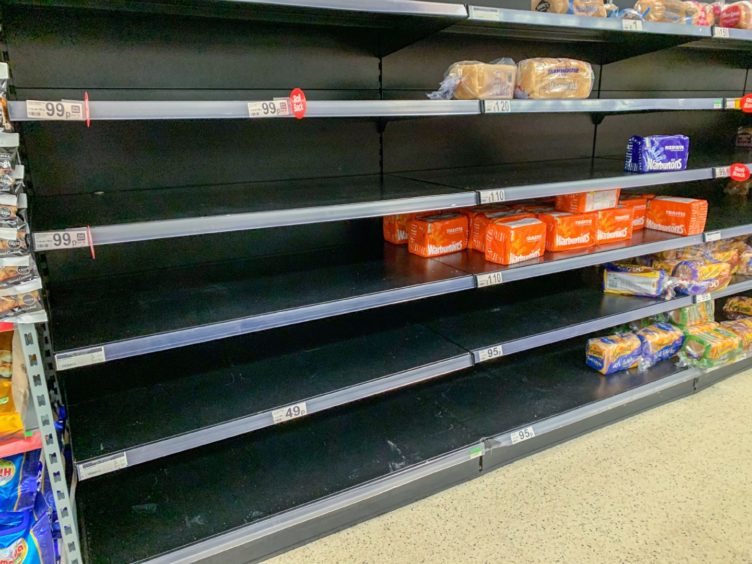Crisis is not a word that should be thrown around frivolously, and certainly not when talking about food supply.
Unfortunately it is a crisis that is now developing with labour shortages being faced by throughout the farming, fishing, food and drink supply chain
There is much debate about the causes.
Some are long term and systemic.
But there is no doubt that there has been a short-term earthquake.
The pandemic has shaken the labour market but Brexit has compounded the problem significantly.

More than one million people from overseas have left the UK during Covid.
The post-Brexit immigration system now makes it extremely difficult for many of them to return, despite the availability of well-paid jobs.
In a recent survey of Scottish food and drink businesses by our partners at FDF Scotland, 90% said current job vacancies were hard to fill and 97% felt the situation would get worse in the future.
And the workforce shortages are everywhere.
They’re on farms and fishing boats, in food processors and haulage firms.
At the customer end, supermarkets, restaurants and hotels are all struggling to find workers.
Photos of gaps on supermarkets shelves are now widespread.
Household names with deep pockets and sophisticated supply chains are getting into trouble; McDonalds, Nando’s, Greggs, the list goes on.
Less visible are the thousands of small businesses struggling to get supplies and make deliveries.
Longstanding problems made worse
This was not an unforeseeable problem.
Scotland has long been a country that suffers depopulation in the absence of immigration.
Our rural areas have seen a drain in the working age population over years.
But if we can’t accept that the developments over the last 18 months have accelerated the problems, the hunt for solutions will be problematic.
Scotland Food & Drink, along with other Scottish food and drink organisations, has written to the UK and Scottish Governments with specific requests to alleviate the workforce crisis.
These included both short and long term actions.
The most important short term step though is for the Home Office to shift on immigration.
Policy is putting off the very people we need
Currently, we have a Home Office immigration policy which is at best ineffective and, at worst, hostile to the very people we need to attract to this country.
A 12-month temporary visa for foreign workers is no panacea, but it could make a big difference, especially in the lead up to Christmas.
For some politicians who have engaged on the subject, there have been glib responses.
“Just hire locals”. “Just increase wages”.
All do a disservice to a complex problem.
Wage rates have been rocketing in many roles (brace yourself for food price inflation, folks).
But still vacancies are unfilled.
A short 🧵on labour shortages.
Tl;dr: The situation is extremely serious. And without Government action, it is going to get worse, very soon.
Some UK food supply chains are now at breaking point.
And, yes, Christmas is at risk. pic.twitter.com/xIRd7Oj5He— James Withers (@scotfoodjames) August 27, 2021
Many areas of Scotland have very low levels of unemployment, so there just isn’t an untapped local workforce.
Of course, the industry has a huge responsibility here too.
We need to raise the attractiveness of our sector, embrace apprenticeships and training.
We need to be ambassadors for fair and innovative work practices.
Many firms, already paying well beyond the living wage, have been trying many alternative routes.
Some are also working with parole officers to employ offenders, others are working with organisations to employ homeless.
I’ve spoken to businesses keen to provide jobs and training to Afghan refugees.
We are trying to work our way out of this crisis as an industry, but right now we need Government intervention to, at the very least, alleviate the short-term issues.
Food supply crisis is unprecedented
I’ve worked in agri-food industry for over 20 years and never have I known business owners to be this concerned about the potential effect labour shortages affecting the food supply chain.
Stocks in shops and warehouses are now at the lowest they have been since records began nearly 40 years ago.
This is an incredibly dangerous position to be in as we approach the annual peak in sales ahead of Christmas.
There is no silver bullet to fix the labour shortage issue.
But denying the problem or ignoring it could be disastrous.
We can hope it might magically “be alright on the night” but it won’t.
Some of those who have sounded the alarm at the end of free movement have been described as the architects of “Project Fear”.
Well Project Fear is now Project Here.
It’s time to start listening to those at the coalface of supply chains that are close to breaking point.












